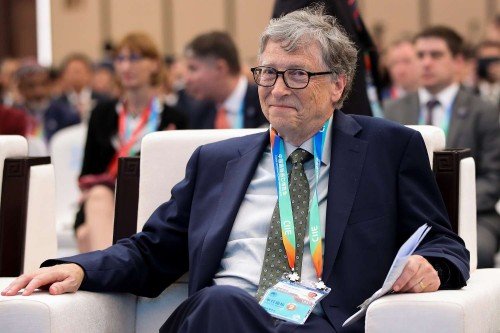
Bill Gates, the co-founder of Microsoft, is one of the most well-known and influential figures in the technology industry. However, his contributions extend beyond technology, as he has also made significant philanthropic efforts in various fields. In this blog post, we will explore the life, work, and legacy of Bill Gates.
Early Life and Education
Bill Gates was born on October 28, 1955, in Seattle, Washington. He grew up in a family of four, with two sisters, and his parents were prominent in their community. Gates showed an early interest in technology, and he began programming at the age of 13. He attended Lakeside School, where he met his future business partner, Paul Allen. Gates went on to study at Harvard University but dropped out after two years to pursue his passion for technology.
The Founding of Microsoft
In 1975, Gates and Allen founded Microsoft, which became the world's largest personal computer software company. The company's first product was a programming language called BASIC, which was created for the Altair 8800 computer. Microsoft went on to develop the Windows operating system, which is still widely used today.
Gates' leadership and vision were instrumental in Microsoft's success. He was known for his competitive spirit and his ability to anticipate industry trends. Under his leadership, Microsoft became a dominant force in the technology industry, and its products and innovations have revolutionized the way we live and work.
Bill Gates is a name that needs no introduction. He is one of the most successful entrepreneurs in the world. He co-founded Microsoft, the largest personal computer software company in the world. Bill Gates has always been passionate about technology and has always been ahead of his time. In this blog post, we will take a closer look at Bill Gates' business, Microsoft, and how it has evolved over the years.
Early Days of Microsoft
Bill Gates co-founded Microsoft with his childhood friend Paul Allen in 1975. They initially started by writing software for Altair 8800, a popular microcomputer of the time. They soon started developing an operating system for IBM's first personal computer, which was released in 1981. This operating system was called MS-DOS, and it became the de facto standard for personal computers.
With the success of MS-DOS, Microsoft became the dominant player in the personal computer software industry. The company went public in 1986, and its market capitalization quickly rose to over $1 billion. By the early 1990s, Microsoft's Windows operating system had become the standard for personal computers, and the company had established itself as the undisputed leader in the industry.
Innovation and Expansion
Under Bill Gates' leadership, Microsoft continued to innovate and expand its business. In the mid-1990s, the company focused on developing internet-related technologies. This led to the release of Internet Explorer, a web browser that became the dominant player in the browser market. Microsoft also developed Windows NT, a more robust operating system for business and enterprise use.
In 2001, Microsoft released the first version of its Xbox gaming console, marking its entry into the video game industry. The Xbox was a major success, and it paved the way for the company's future success in the gaming industry.
The 2000s were a time of expansion for Microsoft. The company acquired several companies, including Great Plains Software, Navision, and Danger Inc. These acquisitions helped the company expand its business into new areas, such as enterprise resource planning, customer relationship management, and mobile devices.
Challenges and Controversies
Despite its success, Microsoft faced several challenges and controversies over the years. In the late 1990s, the company was embroiled in an antitrust lawsuit with the U.S. government. The lawsuit alleged that Microsoft used its dominance in the operating system market to stifle competition and maintain its monopoly. The case was settled in 2001, and Microsoft agreed to certain restrictions on its business practices.
In the 2000s, Microsoft faced increasing competition from companies such as Google and Apple. Google's search engine and Apple's iPhone and iPad were becoming popular, and Microsoft struggled to keep up with the changing landscape. The company's efforts to develop its own smartphone operating system, Windows Phone, were unsuccessful.
In 2008, Bill Gates stepped down as CEO of Microsoft and was replaced by Steve Ballmer. Ballmer's tenure was marked by increased competition and declining profits. In 2014, Satya Nadella took over as CEO and led the company in a new direction, focusing on cloud computing and enterprise services.
Current State of Microsoft
Today, Microsoft is a very different company than it was in the 1990s. The company's focus has shifted from personal computers to cloud computing and enterprise services. Under Satya Nadella's leadership, Microsoft has embraced open-source software and has become more collaborative with other companies in the industry.
Microsoft's Azure cloud platform has become a major player in the industry, and the company's Office 365 suite of productivity software is widely used in businesses around the world. In 2019, Microsoft surpassed Apple as the world's most valuable publicly traded company, with a market capitalization of over $1 trillion.
Philanthropy
In addition to his contributions to the technology industry, Gates has also made significant philanthropic efforts. In 2000, he and his wife Melinda Gates established the Bill and Melinda Gates Foundation, which is one of the world's largest private charitable organizations. The foundation's mission is to improve global healthcare and reduce extreme poverty.
The foundation has made significant progress in achieving its goals. It has provided funding for the development of vaccines, malaria treatments, and other medical advancements. The foundation has also focused on improving education, particularly in developing countries. In addition, Gates has pledged to donate most of his wealth to charity, which is estimated to be over $100 billion.
Conclusion
Bill Gates' contributions to the technology industry and philanthropy have had a significant impact on the world. His vision and leadership at Microsoft revolutionized the way we use computers, and his philanthropic efforts have improved the lives of countless individuals. Gates has also been recognized for his contributions with numerous awards, including the Presidential Medal of Freedom, and he continues to be a prominent figure in both the technology industry and the world of philanthropy.
In summary, Bill Gates is a visionary and a pioneer in technology and philanthropy. His contributions to society have left a lasting impact, and his legacy will continue to inspire future generations to make a positive impact on the world.








